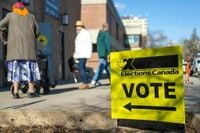Atlantic Canada was the center of attention on Monday, April 28, 2025, as early election results indicated a projected Liberal government led by Mark Carney. This election was particularly significant as it involved 32 seats across Nova Scotia, New Brunswick, Prince Edward Island, and Newfoundland and Labrador. At the time of dissolution, the Liberal Party held 23 of these seats, while the Conservative Party held 8.
Despite the Liberals' stronghold in the region, the Conservatives were performing better than anticipated, particularly in Newfoundland and Labrador. In that province, where polls closed first, six out of seven ridings were previously held by Liberals, but five Liberal incumbents chose not to run in this election.
As the results came in, it was confirmed that Liberal Philip Earle won the riding of Labrador, while Liberal Tom Osborne secured victory in Cape Spear. Additionally, Liberal Joanne Thompson triumphed in St. John’s East, and Liberal Paul Connors emerged victorious in the Avalon riding. On the Conservative side, incumbent Clifford Small was projected to win in Central Newfoundland, and Carol Anstey was confirmed to have won in Long Range Mountains.
In Nova Scotia, the riding of Central Nova was a focal point of the election. Incumbent Sean Fraser, a former Liberal cabinet minister, had initially announced his intention not to seek re-election but later reversed his decision after a call from Carney. In Halifax, which was left vacant after Liberal MP Andy Fillmore stepped down to run for mayor, Liberal Shannon Miedema was elected.
In New Brunswick, the Liberals maintained their hold as Serge Cormier was re-elected in Acadie-Bathurst, and Dominic LeBlanc, who has served as MP since 2000, was re-elected in Beauséjour. The riding of Fredericton-Oromocto also remained Liberal with the election of musician David Myles, who expressed his excitement, saying it was "beyond a dream" to represent his hometown.
Liberal candidate Wayne Long also won in Saint John-Kennebecasis, while Conservative candidates were projected to retain their seats in Tobique-Mactaquac and Fundy Royal. All four ridings in Prince Edward Island remained under Liberal control.
The Liberals had a strong showing in the lead-up to the election, as a recent survey from Halifax-based polling firm Narrative Research conducted on April 21 and 22 indicated that 66 percent of decided voters supported Carney’s Liberals, compared to 26 percent for the Conservatives and 6 percent for the New Democrats.
Mark Carney, who was vying against Conservative leader Pierre Poilievre, had won his seat in the riding of Nepean, according to early projections by CBC. The political landscape in Canada had been notably influenced by U.S. President Donald Trump’s remarks, which many believe shifted voter sentiment towards Carney.
Carney’s campaign focused on addressing the economic chaos resulting from Trump’s trade policies. During a rally in Upper Onslow, N.S., Carney asserted that Trump was "trying to break us as a nation because they want to own us," likening the ongoing trade war to a hockey game where "when someone else drops the gloves, we know what to do." This message resonated with voters in Atlantic Canada, where the Liberals enjoyed higher approval ratings than in other regions.
On the other hand, Poilievre painted a grim picture of Canada’s future during his campaign stops, particularly in Halifax, where he blamed the current situation on nearly a decade of Liberal governance. He cited a study by Policy Horizons Canada, warning that Canadians might lose faith in traditional paths to social mobility by 2040.
As the election unfolded, many political observers noted that Poilievre's aggressive style had not resonated well in Atlantic Canada, where traditional Progressive Conservatives, including Nova Scotia Premier Tim Houston, distanced themselves from the federal leader.
In the Central Nova riding, Conservative campaign manager Tyler Cameron described the campaign as a "yo-yo" due to Fraser’s back-and-forth decision-making. He noted that local residents were primarily concerned about U.S. tariffs, affordability, housing, and the challenges facing Nova Scotia’s lobster fishery.
The election also saw a potential influx of political newcomers from Newfoundland and Labrador, where six of the seven ridings were previously held by Liberals. Among them, family physician Lynette Powell was aiming to unseat Conservative Clifford Small in Central Newfoundland. Powell, who was new to politics, emphasized her connections in healthcare and noted that many voters expressed their support for Carney during her campaign.
As the ballots were cast and the results began to materialize, it became clear that the Liberals were likely to retain their grip on power in Atlantic Canada, albeit with a reduced number of seats compared to previous elections.
This election marks a pivotal moment in Canadian politics, reflecting the ongoing challenges and sentiments of voters in the face of external pressures and domestic concerns. The next steps for Carney and the Liberal government will be closely watched as they navigate the complex landscape shaped by both local and international factors.
This report by The Canadian Press was first published on April 28, 2025.




